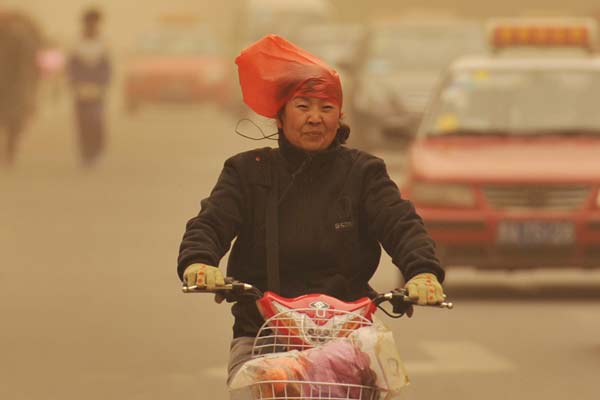City of sand and smog prepares for a dusty spring
Updated: 2013-03-01 00:54
By WANG QIAN (China Daily)
|
||||||||
Smog or sand? Those were the options presented to Beijing residents on Thursday.
Beijingers experienced thick smog in the morning and haze from a yellow sandstorm in the afternoon, resulting in poor air quality, reduced visibility and disrupted traffic.
"Northern China is entering sandstorm season, which usually lasts from March to May," said Chen Zhenlin, spokesman for the China Meteorological Administration, at a news conference on Thursday.
 |
|
A plastic bag protects a cyclist's head as she braves a sandstorm in Taiyuan, Shanxi province. [Liu Jiang / China Daily] |
According to real-time satellite images released by the National Meteorological Center, Beijing and Tianjin, Hebei, Shaanxi and Ningxia provinces and the Inner Mongolia autonomous region were hit by dusty winds on Thursday.
Beijing Municipal Environmental Monitoring Center said the sand mainly came from the middle parts of Inner Mongolia, and asked residents to wear face masks outside or stay indoors to avoid the heavily polluted air.
According to the center's latest statistics, the readings for PM 2.5 — hazardous particulate matter of 2.5 micrometers in diameter that can deeply penetrate the lungs, in northern Beijing reached 452 micrograms per cubic meter, potentially causing serious harm to people.
Smog in southern Beijing reduced visibility to less than 900 meters on Thursday morning.
Although the sandstorm's haze is expected to end on Thursday night, Chen said dusty weather may become active after March 10 with winds predicted.
With a new round of cold fronts passing through the country, the dusty conditions are expected to end and temperatures may drop by up to 14 C before Saturday, bringing snowstorms to parts of Northeast China, said Wang Guanlan, chief weather forecaster of the center, on Thursday.
The Beijing meteorological bureau warned residents that the air pollution from smog in Beijing will gradually change into dust pollution from March.
Many residents in Beijing wore face masks on Thursday.
"It is pollution, it doesn't matter if it is from haze or dust," Wu Jialu, a 30-year-old woman in Beijing told China Daily while wearing her mask with a carbon filter.
She bought dozens of such masks online and planned to wear them when outside until May.
Wu's preparation for the bad weather and air pollution was given a thumbs up from an atmosphere composition professor, who said hazy and dusty weather may become frequent if pollutants in the atmosphere are not cut.
"Take Beijing for example. According to our monitoring, from 2008 to 2009, the pollutants in the atmosphere reduced dramatically, so we got more blue skies. But after 2010, pollutants soured," said Wang Yaqiang, deputy director of atmosphere composition institute at the Chinese Academy of Meteorological Sciences.
To improve the capital's air quality during the Olympic Games in 2008, Beijing shut down 150 heavily polluting chemical engineering and cement factories, and more than 70 percent of government vehicles were banned from the roads and strict traffic controls were imposed.
"Only when we effectively reduce the emission of pollutants will blue skies return," he said.

 Li Na on Time cover, makes influential 100 list
Li Na on Time cover, makes influential 100 list
 FBI releases photos of 2 Boston bombings suspects
FBI releases photos of 2 Boston bombings suspects
 World's wackiest hairstyles
World's wackiest hairstyles
 Sandstorms strike Northwest China
Sandstorms strike Northwest China
 Never-seen photos of Madonna on display
Never-seen photos of Madonna on display
 H7N9 outbreak linked to waterfowl migration
H7N9 outbreak linked to waterfowl migration
 Dozens feared dead in Texas plant blast
Dozens feared dead in Texas plant blast
 Venezuelan court rules out manual votes counting
Venezuelan court rules out manual votes counting
Most Viewed
Editor's Picks

|

|

|

|

|

|
Today's Top News
Boston bombing suspect reported cornered on boat
7.0-magnitude quake hits Sichuan
Cross-talk artist helps to spread the word
'Green' awareness levels drop in Beijing
Palace Museum spruces up
First couple on Time's list of most influential
H7N9 flu transmission studied
Trading channels 'need to broaden'
US Weekly

|

|







